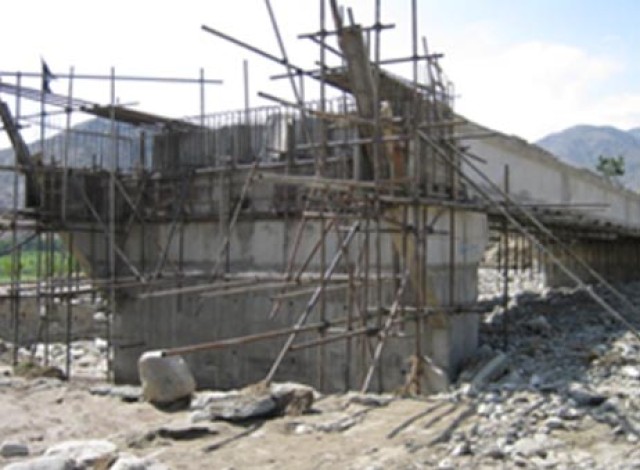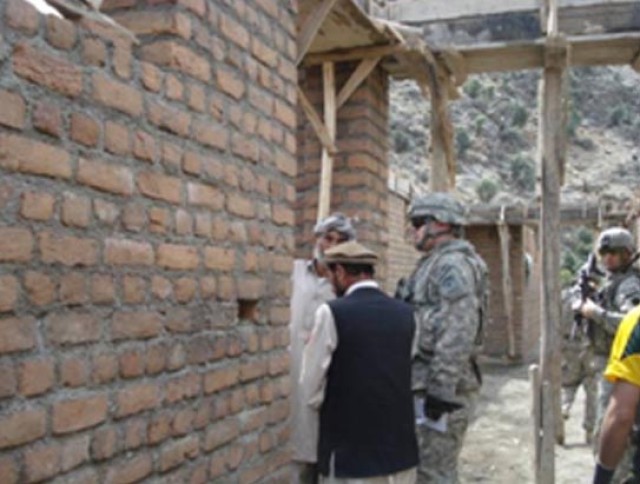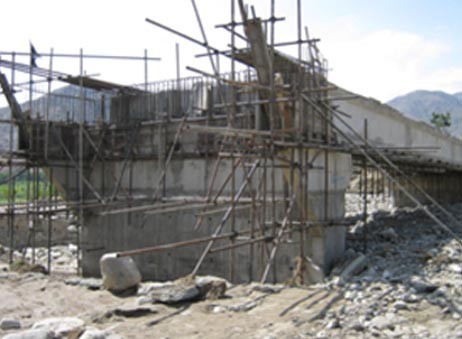KABUL - As a group of U.S. Provincial Reconstruction Team (PRT) engineers arrived to tour a school compound under construction in a village in the eastern region of the country, an Afghan QA named Shaida Wali met them at the gate and led them inside. The man pointed out the most recent work completed by a team of Afghan construction workers to project engineers. He guided them through the heavily constructed building, noting the quality and progress of the electrical system, the plumbing system, well houses, boundary walls and other aspects of the job. Likewise, he also pointed out deficiencies in the construction. The man also served as a translator between the PRT personnel and the construction crew's foreman and workers, who all spoke Dari. After wrapping up the inspection, the Afghan man and their armed security team moved onto similar projects in the near-by villages. Shaida Wali serves as a quality assurance inspector for the PRT which has oversight of millions of dollars' worth of construction projects in the eastern region of Afghanistan.
In all, 30 Afghans work in professional capacities as part of the PRT's human capital development initiative in Afghanistan. Some work primarily in PRT offices, while others work primarily in the field. Similarly, other PRT offices in the east district of Afghanistan tap the local workforce. Quality assurance inspectors review and report the status of PRT projects across the country. For some projects in distant locations, they are the only representatives of the PRT to visit the sites. The intent of the program is two-fold; Afghan workers extend the PRTs ability to build infrastructure projects in the country, which is the size of Texas and more importantly, the program is helping develop a new generation of Afghan workers with job skills that languished during three decades of war. Afghanistan has a labor force of 15 million people, but 40 percent are unemployed, and 53 percent of the country's population lives below the poverty line. This is according to the 2010 edition of The CIA World Factbook, which compiles statistics about countries worldwide. In that type of economy job skills are priceless and skills transcend wages. Once workers gain that knowledge, they have it forever. Knowledge allows them the opportunity to earn a better living and to pass on a trade or this better living to their children. The thinking is that after the coalition's multi-billion-dollar rebuilding efforts in Afghanistan come to completion, the skilled Afghan workers will remain and be available to work on new private-sector construction jobs. Afghans aligned with the PRT are eager to learn new skills and they're attuned to the PRTs interests. They're very interested in what we are doing and they actually do pretty a good job with respect to quality assurance, workers getting paid, and safety. If they get any pushback or problems, they let us know. Part of that success is spurred by close interaction among American PRT personnel and Afghan hires. Americans and Afghans work side by side both in the office and in the field. Furthermore, PRT personnel present monthly seminars on specialized topics such as electrical codes, reading architectural plans, and computer-aided drafting. Simply working in the same setting spurs meaningful development.
What I have noticed during my almost nine months here is that their English speaking ability has just soared. Some of them could just speak one or two words when I got here. It is the daily interaction with our folks, both in a working environment and a social environment. The PRTs are making plans to increase social interaction with regularly scheduled lunches for all members of the staff. This direction stems from General Stanley McChrystal's counterinsurgency guidance. GeneralMcChrystal, the commander of international forces in Afghanistan, wrote in August 2009 that conflict in Afghanistan will be won by gaining the support of the population, rather than by destroying the enemy. The relevant passage of the general's message states: "Live, eat, and train together, plan and operate together, depend on one another, and hold each other accountable - at all echelons down to soldier level. Treat them as equal partners in success." This will present ideal opportunities for meaningful social interaction. We can just talk about their hopes, dreams, aspirations, and how they feel about the coalition effort here. How is their image of us and our effort different than what they grew up seeing or hearing from their parents about the Soviet era' Do they see the effort that we are doing together as a springboard toward a self-sufficient, democratic Afghanistan'"
Another Afghan who has been working with the PRT since 2006 said he has had a positive experience. The man, who was wearing a gray suit jacket one day recently, started as an administrative assistant in the PRT office and has since been promoted to a quality assurance inspector. "I am so happy. I am coming here. I am working here. I find lots of experiences from here," the man said in English. "And I like everybody. We are working like a family here." Working with the PRT provides an ideal setting to learn about the engineering and construction trades, because the PRT adheres to construction standards that other organizations in Afghanistan ignore. "This is an engineering office. It is the best office in Afghanistan to work, because of standard work," he said. He plans to become an engineer himself. While the relationship is positive on a one-to-one basis, the capacity development program is not regarded warmly by everyone in Afghanistan. The man in the gray suit jacket said he has not told his Afghan friends that he works with PRT, because he is afraid the information might somehow get into the hands of anti-American insurgents. Instead, he's told friends that he works for an Afghan construction company, which is technically correct, because the PRT holds a contract with an Afghan company that provides the workers, rather than with the individual Afghan workers themselves. The country simply is not stable enough yet for some Afghan workers to be public about their association with the PRT. They or their families could become targets of insurgents. The last thing we want to do is jeopardize the safety and security of one of these people who really are putting their lives on the line daily to support our mission.
(Article was submitted by SIAD employee Kelley Murray currently serving as the PRT Program Manager in Afghanistan)




Social Sharing